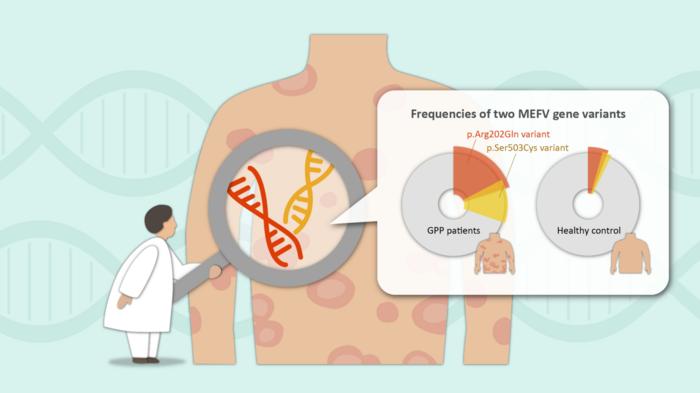A team from Nagoya University in Japan has identified previously unidentified gene variants that are associated with the development of generalized pustular psoriasis (GPP). The team’s findings, published in the Journal of the American Academy of Dermatology, offer hope for improving diagnosis and therapy.

Credit: Reiko Matsushita
A team from Nagoya University in Japan has identified previously unidentified gene variants that are associated with the development of generalized pustular psoriasis (GPP). The team’s findings, published in the Journal of the American Academy of Dermatology, offer hope for improving diagnosis and therapy.
GPP is rare, but its effects are often serious. People with GPP can experience recurrent flares of the disease, which include multiple erythematous lesions and sterile pustules over the whole body, often accompanied by fever and chills. This can lead to emergency treatment and even death.
Until now, researchers have reported six genes associated with GPP. Although these genes are widely used for diagnosis and treatment, there remain GPP patients who do not have any variants of these genes. This suggests unknown genetic factors associated with the development of GPP.
To address this problem, a group led by Prof. Masashi Akiyama, Takenori Yoshikawa, and Dr. Takuya Takeichi from the Department of Dermatology at Nagoya University Graduate School of Medicine used next-generation sequencing to investigate the genes of Japanese patients with GPP. They found that higher frequencies of two MEFV gene variants, p.Arg202Gln and p.Ser503Cys, were associated with GPP. In particular, 21% of the patients carried the variant p.Arg202Gln variant and 13% carried the p.Ser503Cys variant.
Pyrin, the product of MEFV, regulates inflammatory pathways. But specific variants of pyrin induce excessive neutrophil migration to tissues, eventually triggering excessive inflammation. This finding, therefore, suggests a likely path for the disease.
The researchers believe that therapies targeting inflammatory pathways related to MEFV are a promising therapeutic strategy for patients with these variants. According to Yoshikawa, their findings suggest a new use for a commonly used drug to treat familial Mediterranean fever (FMF): “As these variants are associated with both FMF and GPP, treatments for FMF may also be effective for the treatment of patients with MEFV-associated GPP.”
Journal
Journal of the American Academy of Dermatology
DOI
10.1016/j.jaad.2023.10.070
Article Publication Date
19-Dec-2023




